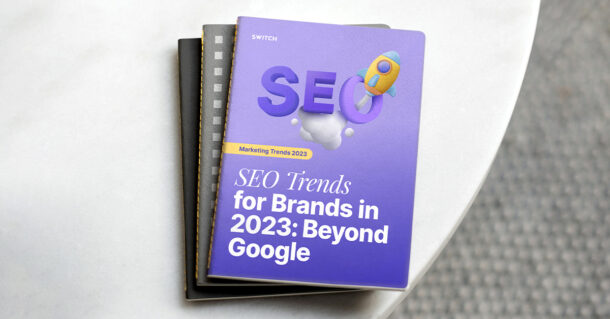Fair warning, this is a relatively long read. If you don’t have the time to take it all in now, you can download the PDF version of our 2023 SEO Trends article for free by clicking below. Otherwise, just keep reading!
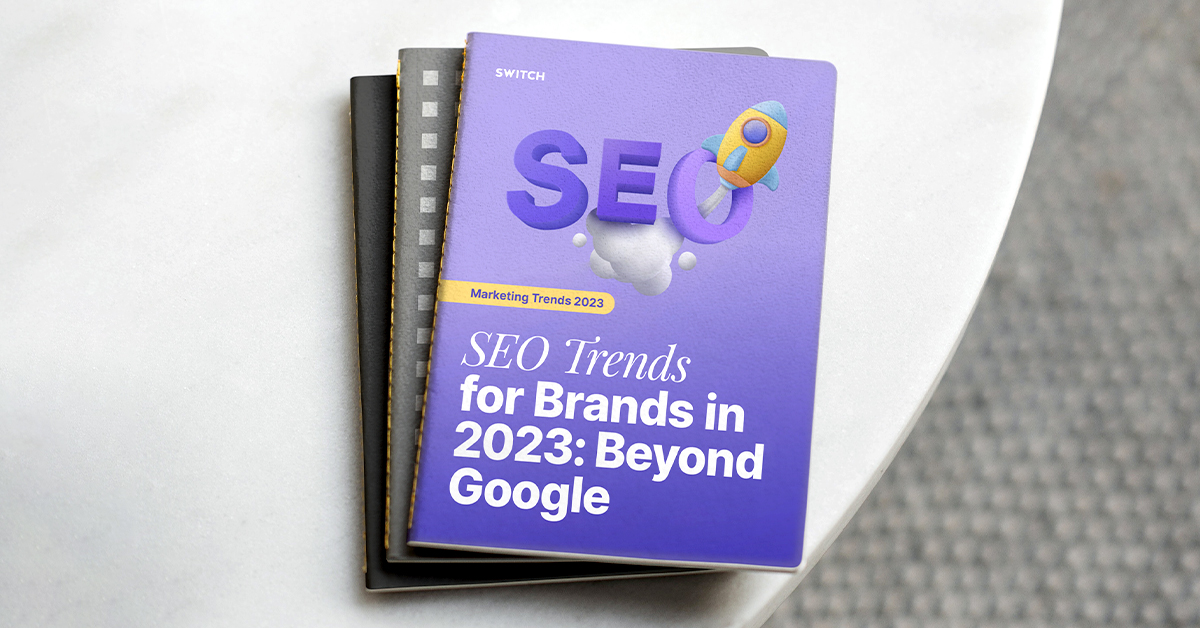
SEO Trends 2023
If you’ve kept up with the latest changes in SEO/search engine optimisation, 2023 is not going to bring you much that’s different. That is, if you consider SEO to just be the process of optimising websites to rank well on Google search only.
On that front, in 2022 there was a turn towards the increasingly human. Google is cleverer and more adaptable than it’s ever been, and the way you can tell is through the ever-more complicated laundry list of how you rank there.
In 2023, not much has changed. This article will address all those evolutions, but we’ll be taking a step further – or rather, a step back.

What is a search engine, really?
Search engines have shifted from essentially being a website directory to being a place where you get your answers directly without having to go beyond the results page. With this redefinition, we need to expand our criteria for what a search engine actually is.
Is Amazon a search engine? TikTok? Instagram? Twitter?
In short, yes they are.
Here’s what Google’s Senior Vice President Prabhakar Raghavan had to say recently:
“In our studies, something like almost 40% of young people, when they’re looking for a place for lunch, they don’t go to Google Maps or Search. They go to TikTok or Instagram.”
If a significant enough portion of users on that platform are searching, then it is a search engine – albeit for a more limited range of results in either content or format than something like Google, which endeavours to provide everything. And this is likely why Google is likely losing market share to these platforms. The internet is so vast that it’s nearly impossible to understand a searcher’s intent completely, even if Google gets extremely close to that.
The result is a number of platforms upgrading their search functionality to provide what their users want more easily, and keep them engaged. This means that if brands want attention, they can’t just run a few Google Search campaigns or invest in SEO. They need to expand their strategies to account for new patterns in user behaviour.
With all of this in mind, here are the main trends and advice you should keep in mind when thinking of SEO in broad terms during 2023.

Trend 1: Great content is still King
Fine, this one isn’t really a trend. It’s more a reminder that no matter what trends come and go, there is no replacement for great content. A strong SEO strategy still requires diligent and in-depth research, excellent planning, and detailed execution. This is true no matter the platform – be it Google, YouTube, TikTok, or any other search engine, the cream always rises to the top (of search result pages).
If there’s any trend from a content point of view that should be especially highlighted here, it’s video.
This should come as a surprise to no-one. The internet is increasingly turning towards video: YouTube’s (and now TikTok’s) astronomical rise to one of the most used social media platforms has also kicked off a chain of prioritising video over static imagery and posts – and SEO is no different. Look up anything on any given search engine, and very often the first few results will be clips or videos. In 2023, this is going to only grow more prevalent as Tiktok continues to legitimise itself as the brand platform of choice for brands looking to build communities, and as other social media platforms follow suit.
That being said, it’s worth keeping an eye on TikTok following its ban from India and ongoing troubles in relation to its data gathering practices that could see it banned in more major markets such as the US. It will definitely be interesting to see which platforms will step in to fill the void, should this happen.
Statistics:
- The number of comments, views, shares, and “likes” have a strong correlation with higher YouTube rankings. (Backlinko)
- Video was the primary form of content being created in 2022, followed by blogs (used by more than half of marketing teams), and images (HubSpot).
- Although 32% of people say they are overwhelmed by the amount of content available, a majority (44%) say they typically consume three to five pieces of content before engaging with a vendor (DemandGen).
As a brand, how can I use this trend?
Create great content. Sounds simple, and it is. Mostly.
Understand the needs and wants of your target audience and what they search for, and create content that answers those needs better than the competition. And we’re not just talking about video – this applies across the board, from written content, to video, to podcasts. With search trends indicating that Google is no longer the only search game in town, it only makes sense to diversify and expand your online presence as a brand to keep up with this change in user behaviour.

A note about AI and content generation
By the way, if you saw ChatGPT and saw a tool that can write SEO-ready content for you within minutes, don’t get your hopes up. Google is already on top of this thanks to its August 2022 helpful content update that will “ensure people see more original, helpful content written by people, for people, in search results”. Basically, Google will consider content taken wholesale from an AI writing tool as spam. Your content needs a human touch, and probably always will. AI models like ChatGPT provide a starting point for content, but never an end product – at least not for SEO. Not yet, at least.
A note about AI language models and search
Speaking of ChatGPT, Google isn’t taking the news of an AI language model that can easily and clearly answer queries without users needing to click on any links very well. While ChatGPT has some limitations at the moment, many have come to the conclusion that as it grows and develops, it will definitely become a major competitor to Google Search. A fact that Google is now keenly aware of.
In fact, Google founders and parent company shareholders Larry Page & Sergej Brin are taking a more hands on approach to providing their advice to solve this particular issue – something they do not do very often, so you know the company is really concerned. We should definitely expect some major announcements from Google about AI search tools in their next Google I/O event, happening in May.
The impact of a ChatGPT-esque tool making its way to Google Search is still relatively unknown, but it could mark the largest shakeup in the SEO world in a long time. If less and less people are clicking on links, what’s the point?

Trend 2: Mobile First
Websites in 2023 are going to rank based primarily on the mobile version of their content rather than the desktop version; this heralds a change in the way that people are using search to answer their queries. As more and more people use mobile phones, especially out and on the go, it’s become far more relevant to rank web-pages based on the way they showcase and load on mobile devices.
This doesn’t mean that desktop ranking is going anywhere. It just means that having a strong mobile experience will bump you higher up on the list of where you are. You don’t need to fully-replicate your site on mobile, but you do need your site to load quickly and with a good UI on mobile – and given that your consumers almost absolutely use their phones or tablets as their primary device, you need to take advantage of the shift now.
Statistics:
- 96.41% of all Google searches happen on mobile devices.
- 91% of the global population has smartphones.
- 62.06% of all website traffic comes from people using mobile devices.
As a brand, how do I use this trend?
Pay attention to your mobile site. Creating a web page for your brand and making it look beautiful, and work great on desktop, is critical if you want to attract the kind of attention that will lead to lasting returns – however, just having a good web page that you rarely update to reflect the changes doesn’t help anyone. To truly capitalise on the way that Google’s changing, you need to keep up with the way that it’s changing – and that means adapting your web page to reflect best practices.
In this case: faster web pages, and taking the time to implement AMP, Google’s faster mobile experience, into your web pages.

Trend 3: Zero-click Content and Featured Snippets
A good search engine experience is a short one. At least, that’s what Google thinks. That means that over the past few years, Google has done everything they can to provide answers to search queries as quickly as humanly (machine-ly?) possible. This has manifested itself in ‘featured snippets’. The bit of text that rises above all search results and provides the most direct answer to the search query. It’s also represented in the data and information displayed on the right hand side of results.
This means that in order to rise to the top of search results, a website doesn’t necessarily need to rank at no. 1. They just need to answer a search query as simply and easily as possible.
Statistics
- Less than half of Google searches result in a click
- 50% of a mobile screen is covered with a featured snippet.
- 19% of SERPs have featured snippets.
As a brand, how can I use this trend?
When creating searchable content, make sure to answer as many commonly searched questions as possible – in the form of an FAQs section, for example. The answer itself shouldn’t be longer than a couple of sentences, too. Also, always make sure your content is dated – studies have shown that most featured snippets come from content not older than a couple of years.
Google SEO Trends from 2022 that are here to stay:
Most of what we wrote in 2022 still has a lot of room left to grow. Here’s what’s sticking around.
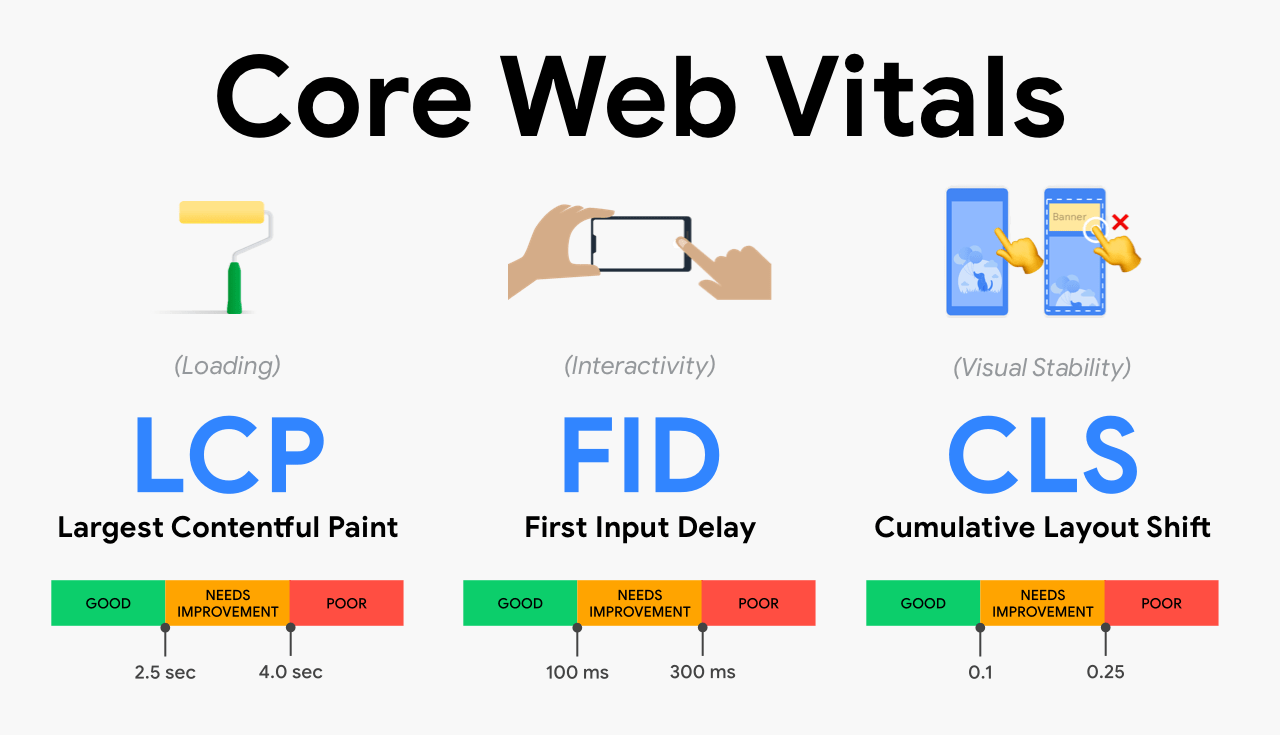
Core Web Vitals
This isn’t really a trend so much as the natural progression of technology making changes that businesses will need to keep up with. Core Web Vitals is the answer to the way the web is changing: it charts the way your website loads, how your website reacts to input from a user, and how stable your web visuals are. Essentially, it’s how your website ranks in Google’s algorithm from a technical perspective – and it’s as important as content for ranking well. Given that the internet has become increasingly competitive, with a much greater emphasis placed on ranking well, Core Web Vitals are only going to become even more important as time goes by.
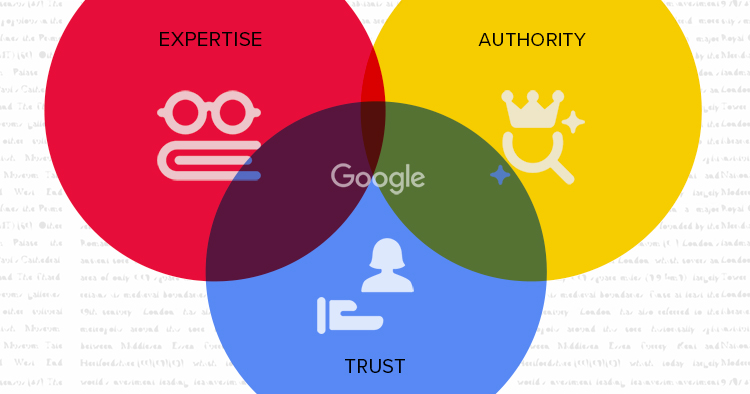
EAT
Expertise. Authoritativeness. Trustworthiness. Content that heavily features all three is content that is going to rank well, and it stands to reason that in the internet era of fake news and misinformation, Authoritativeness and Trustworthiness are two of the most fundamental facets of any content going forward, and consumers will actively seek out an opinion to their queries that is rooted in fact. The wide scale deranking of misinformation is also playing a part to retain this trend well beyond 2023.
What changes are coming to Google?
Future AI projects aside, Google is constantly tweaking its algorithm to maintain its position as the number one search engine in the world, which means new features come to Google often. Here are a few of Google’s features that should get more attention in the coming months.

RankBrain
RankBrain, a core component of Google’s algorithm, uses machine learning to find the best results for whatever queries are plugged into it. It follows on from other AI advancements in the field, where Google first supplies RankBrain with data from several sources and then moves into teaching it over time how to replicate the way humans think when it comes to producing search results to a query.
In other words, a big part of RankBrain is figuring out the searcher’s true intent, and thus giving more accurate results to whoever is searching. Google’s algorithm is becoming sophisticated in its own right, but finding results on the internet for what you’re looking for can sometimes be a bit hit and miss if you’re not very obvious with your search intent. Adding artificial intelligence is a way of combating those occasional missed results.

BERT
The Bidirectional Encoder Representations from Transformers model, or BERT, is a method of training artificial intelligence software to respond to queries in a far more human way. BERT and AI Platform training are two of Google’s greatest investments into the future, and with Google setting the terms for search, we’re likely to see a greater shift towards artificial intelligence training as a result. BERT is initially trained on large pieces of text, then training results are applied to tasks that require natural language processing, such as answering questions.
Google has been interested in leveraging AI in order to improve the way its search engine functions, and so we’ll likely see more developments on AI in the near future. This is not so much a trend as another natural progression: with search engine algorithms hitting the peak of what they can achieve, now the onus is to exceed what’s capable through AI. This has now been supercharged by the arrival of other AI language models that could be taking share of mind within the search space away from standard search engines.
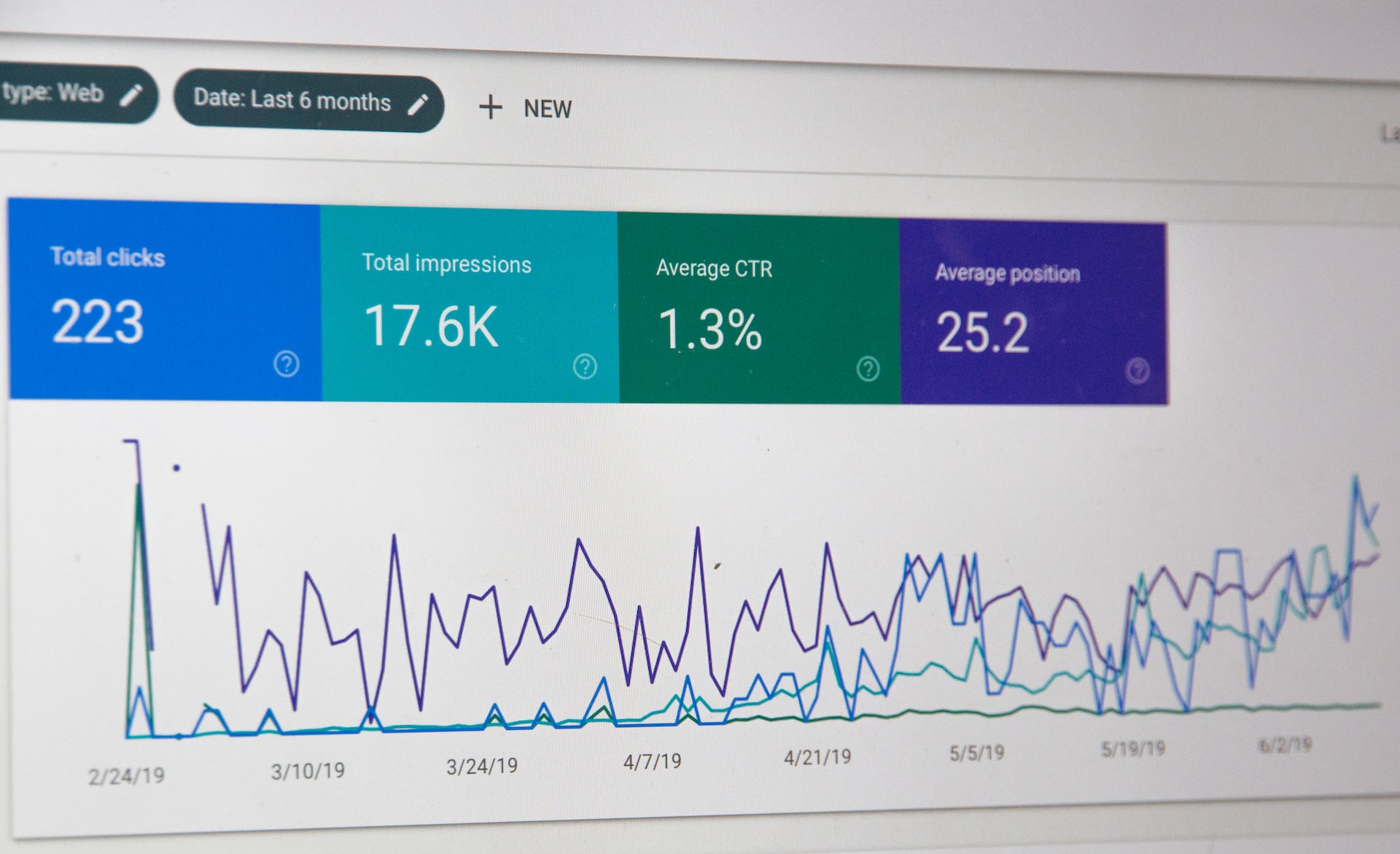
Conclusion
The position of SEO today has changed drastically from what it was at the beginning, and we’re only going to see it change further before the year is out. What started as a way of ranking on a search engine was further complicated by the introduction of an algorithm, changing rules, new platforms, and the increasing importance of searcher intent – and it’s not going to go away.
The only thing you can do is keep up.
And if you’re struggling to do that, we’re here to help you.





